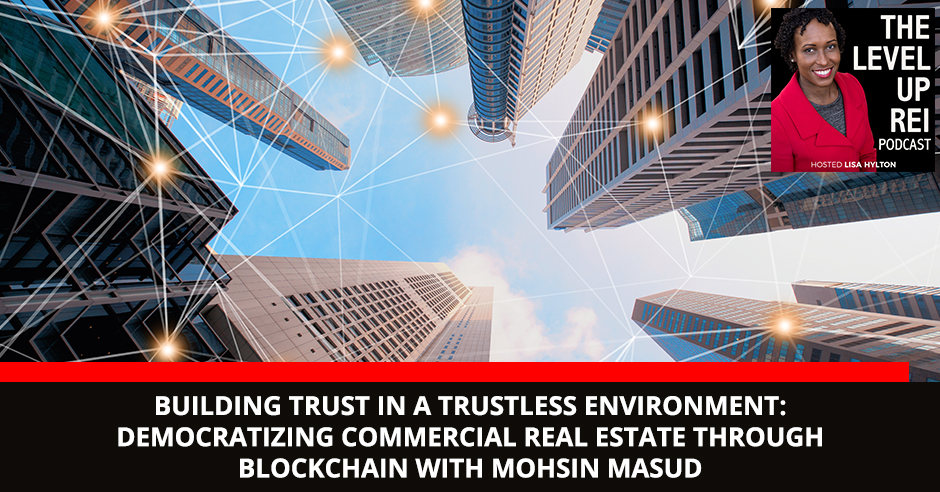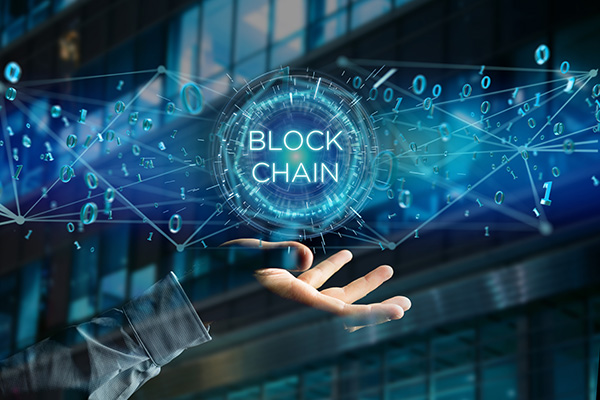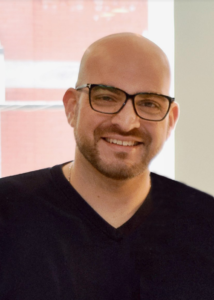
Blockchains provide trust in a trustless environment. And in the real estate environment, trust plays a big role. Blockchain can help in real estate transactions, liquidity, and more. It can also make it more efficient and accessible to people. Join Lisa Hylton and her guest Mohsin Masud as they talk about how real estate relates to blockchain and cryptocurrency. Mohsin is the founder and CEO of AKRU. Learn how he makes real estate investing more accessible and efficient by tokenizing your assets. Learn more about this technology today!
—
Watch the episode here
Listen to the podcast here
Building Trust In A Trustless Environment: Democratizing Commercial Real Estate Through Blockchain With Mohsin Masud
I am excited to have on the show Mohsin Masud. He is the CEO and Founder of AKRU, a real estate investment platform working towards democratizing commercial real estate investments. He is an expert in real estate development, tokenomics, specifically utilizing dual and three token blockchain architecture for the tokenization of real world assets.
Mohsin has over a decade of experience in real estate investments, development, and having run a successful investment company. He studied at York University, Harvard Business School, a graduate of Design at Harvard University and Said Business School. This is a school at the University of Oxford with a focus on Finance, Real Estate Development, Urban Design, and Blockchain. I’m happy to have you on the show. Welcome.
That makes me sound super smart, which I’m not, but thank you for having me. I appreciate it. I’m excited to be here.
I’m excited to have you on. We met in Austin at the Blockchain Real Estate Summit. It was my first time getting exposure to blockchain and real estate. I had to do some research before going there and then got dunked into all this blockchain stuff. I’m excited to have you on. We’re going to jump right in. My episode is broken into three parts, background, experience, and then the level of questions to close things down. Can you share with my readers where in the United States do you live?
I live in Cincinnati, Ohio, in the heart of the Midwest, but I’m not originally from here. I moved here from LA several years ago.
I’m based in LA and it is my town. What do you and your family like to do for fun?
We’re very outdoorsy people. Moving from LA to Cincinnati was a little bit tricky on that front, especially in the wintertime, but having lived in Toronto, Boston and New York, the winter is not half as bad over here. A lot of snow over here is 1 to 2 inches, which is fabulous still for doing a lot of outdoorsy things. Whether it’s going out biking, hiking, hitting the water, one way or the other, jumping in on a board, or whichever way. That’s what we love. We love going in whatever little time we can find.
Jumping right into the experience part of the show, let’s start with the basics. Let’s start with what blockchain is, the connection to cryptocurrency, and then real estate.
Blockchains provide trust in a trustless environment.
Blockchain is a ledger, which is immutable, where information is recorded using hash functions and mark outreach. Every time a set of information is completed and a block is formed, that is to the next block in this suit, and that needs to happen. Multiple blocks put together all the information where it’s recorded in an immutable form. The fact that those blocks run in the chain, this form of database or the distributed ledger is called a blockchain.
The whole purpose of this is to provide trust in a trust test environment. What that means is putting the trust in the community at large and ensuring that the ledger can’t be changed, information can’t be recorded, and problems can be solved without the consent of the majority of the network. Distributed ledger means the total database is copied on different knowledge or computers throughout the whole network and every copy remains the same. If there’s a change and the rest of them don’t match, that’s not true.
That’s how it gains its immutability more so. It’s the simplest way to break down blockchain. One thing I’d like to point out is blockchain is a distributed ledger. It’s the underlying technology behind cryptocurrencies. You asked me what cryptocurrencies are. Cryptocurrencies are utility token, which are developed on a network of the decentralized ledger. They’re based on that DLT technology where information is recorded in those blocks using macro functions in cryptography. Those blocks are collected together through a chain. They’re one part of the use cases that blockchain technology has.
Can we then dive into the connection between real estate, blockchain, and even your history? How did you even get started in blockchain and real estate?
The connection between real estate and blockchain is blockchain makes it a lot simpler and more efficient to conduct a lot that is real estate transactions. It’s a matter of how that gets implemented to ensure that you comply with local laws. If you look back in 2016, 2017, and 2018, you had a lot of initial coin offerings, newborns or these ICOs coming up. At the end of 2017, the SEC started to crack down on a few bad actors who were starting to do fraud, non-scorings, and ICO’s for raising money for no reason whatsoever. That’s one aspect.
Another thing that blockchain unlocked was the fact that if there’s a coin that can be traded on a decentralized ledger, information can be kept secure, and the entire network could get to a consensus on, “Yes, this is true information. I have this information,” and everyone around says, “Yes, this information is accurate,” then you’re adding trust in that environment. It’s not like someone is giving me money and I have this ledger saying, “I owe Lisa this much money. Lisa has invested X dollars with me. Daniel invested Y dollars with me and Michael invested Z with me.” It’s recorded on this immutable ledger.
There are so many efficiencies that can be brought in within the transactional space that it makes all the sense to utilize this technology for it. It’s not like blockchain is the solution. It’s what you build on top of the ledger or using the technology is what the solution is. Saying blockchain is the envelope solution for any problem, that’s not the answer. Blockchain is just a technology. It’s like whether you use Sprint, T-Mobile, Verizon or AT&T for your cell phone service, they are a service provider and they provide you with telephone service or internet service on your phone, and that’s all that they do.
Even if I take it a step further and say you don’t know what TCP IP port is your internet connection running on, but it is an integral part of the underlying technology for the internet. Internet is not what things are built using, but it’s something that applications are built on using as a solution. Blockchain is very simple. Blockchain is a general purpose utility that can be less for multiple things. It’s like electricity is used to light up bulb, the internet is used to connect you to the World Wide Web, and so blockchain is used for building different applications.

Blockchain Real Estate: Blockchain is a ledger that is immutable where information is recorded by using hash functions and mark-up tricks. Every time information is completed and a block is formed, it will link to the next block in the series.
One of the applications where it’s useful is drugs. That’s been a use case that’s been talked about in 2013, from the very early days as adoption started to grow. We didn’t see too many real projects come out of it. There are some pioneers in the space who worked on taking land registries onto the blockchain, taking away all of these county auditor offices, and moving all of their data on the blockchain. The problem with that is that market is so fragmented in the United States.
There are a few hundred thousand counties across the US. How do you get all of them to agree? How do you get all of the associated offices with each county office? You’re going to have the county auditor’s office, and then you have to have the county treasurer’s office, then you’re going to have the county clerk of courts office and so on and so forth. Everyone gets involved in these real estate transactions. That entire network of bureaucratic offices, which need to be convinced to move on to the blockchain is not that easy to breach. It will eventually happen, but not in the near future, in my opinion.
There needed to be a solution that needed to resolve that and to remain within the existing circumstances and the conditions that we have. That’s how we got into it. How did I get involved into it? My background is real estate investment. I grew up in a family where we did real estate investing globally. I was originally born in Pakistan, brought up over there, and went to high school over there for my undergrad at York University, which is up in Toronto, Canada.
I moved back to Dubai and I started investing across the Middle East. I was based out of Dubai in Pakistan at that time, managing our families’ investments across the Middle East, Europe, and Africa. Around 2009 and 2010, I expanded our investments into North America. I made my first investment in Toronto and then across the West Coast to LA, Reno, Nevada, and Scottsdale Phoenix area. That’s when I moved to the US as well and doing investments across.
After the financial crisis, I went to HBS Grad School of Design and so on. I built up my own business. I started investing in the Midwest in 2012, ended up moving to Cincinnati in 2014, and parted ways from the family business, all remaining within the real estate space. What this journey left was me raising capital from friends and family to invest in real estate. I started syndicating and running an investment management firm.
The first redemption that I had to deal with came in towards the end of 2017. It led me to a tour around, going and seeing the different investors that we had in person and eventually raised the capital and bridge the gap for the prospect. I got disrupted by the redemption. I met with a friend of mine in Toronto, who also happened to be an investor in some of my other projects, and say, “This is what’s going on. Have you heard about blockchain?” I said, “I know Bitcoin, Etherium, maybe some other cryptocurrencies and all this ICO stuff that happened.” He said, “Do you know about what the technology can do?” I said, “I don’t.”
It took about a couple of hours and he walked me through this whole thing. As he was explaining the distributed ledger to me, as he explained the benefits of it, how the transactions are and how the coins or the cryptocurrencies can be traded back and forth without the originator being involved in it, this could resolve so many of my problems. I’ve dealt with the redemption. I would never have to deal with that again. You were invested in my property, and that was a point that I did, which was docked by that property.
You could sell your coin to the next person if you needed the money right away, or you could hold on to it. I also realized the efficiencies in the system was I could reduce the minimum investments that we have in our projects. Our minimum investment needs to be $250,000. That stuck me on the high end, but the initial process was reduced to $50,000, $25,000 or maybe $10,000. By March of 2018, I’d realized, “This is not co-exist to fall under securities for a view. We need to get the SEC okay on this.”
Blockchain is not the end-all solution for any problem. It’s just technology.
In early 2018, you have to realize the SEC didn’t want to touch anything related to blockchain because everything in their view was an ICO and it was going to be a scam that people were going to run away with. There have been too many bad actors that destroyed that image for the technology. We brought on some attorneys and that’s how we got involved within the blockchain space. I went to Said Business School at Oxford and took their Blockchain Strategy Program. I started to study this more and more and got deeper into the weeds of it. That’s how I got deep into blockchain and the intersection of blockchain and real estate, creating the first platform for fractionalizing commercial real estate and trading it.
Let’s jump right into AKRU. What is AKRU? If someone is reading, and they’re thinking, “What is this AKRU business?” What is it and how does it work?
We want you to accrue wealth to over a period of time by making smaller investments whenever you can. That’s the purpose of AKRU. The ideology behind AKRU and our core mission is to democratize commercial real estate investment. That sounds super generic in a certain way, but what AKRU does is we take any commercial real estate asset and break it down into tokenized shares and/or tokens, or membership interest units, whatever you want to call it. We bring it down to a small denomination, which is one part of the business.
The second part of the business is we enable liquidity in the real estate market. That means that these shares, tokens, or these membership interest units are not tradable on our platform as well. You go and sign up on Akru.co, you set up your account, go through all the KYC and verifications. We’ve got to make sure you are who you are saying you are, make sure you pass all the AML things and whatnot, you can start depositing money in your AKRU account and start investing in buildings of your choice.
You got to pick and choose what building or project you want to invest in. You’re investing in that. It’s not like you’re invested in a secured portfolio of shop malls, office buildings or something that you don’t want exposure to. You just want to invest in a storage facility, industrial parks, or you like short-term rental or multifamily assets right there.
Are all those types of projects currently on your platform?
We have three properties on the platform. We had a short-term rental property that’s on the platform now. There is a multifamily asset that’s on there as well as a mixed-use building.
How do projects get on the platform?

Blockchain Real Estate: Blockchain makes real estate transactions a lot simpler and more efficient. It can also keep information true and secure in immutable ledgers.
If you own an asset, there’s a button at the bottom of the page of our home page that says, “Submit your Property.” It’s super simple. You have to give us your basic information on the website. We will call you right back. We get all the information from you. You value the property for you to do a quick initial due diligence on it, spend about 5 to 7 days and get back to you with our initial thoughts and valuation on it.
There’s a lot of benefits for asset owners who should tokenize and fractionize their assets. They can recapture on their gains and can maximize their returns. It sounds like I’m saying it for it but let me explain to you how that happens. If you do a deep dive into the appraisal of any larger commercial real estate, let’s assume a $100 million building in the heart of Newell, Kentucky. The appraisal on that asset is going to have a certain core value for the asset, and there’s a factor for discount and marketability that gets added onto that value as well.
Before they get to that gross asset valuation, the appraised value of the asset, the actual value that the appraisers have for the building is maybe $150 million, and then there’s that discount and marketability that gets applied to it, and that reduces it down to $100 million. By fractionalizing it down into dollar shares and then having that secondary market where it’s treatable in significantly smaller pieces and not as one large chunk, that reduces the risk of liquidity and that increases liquidity on the asset.
Now, that discount on the market turned into a liquidity premium on that asset. While we still may not be able to achieve the $150 million true value of the asset as the liquidity on the platform increases, that will get closer and closer to it. Initially, we expect about a 15% to 20% increase in the value of the assets from the get-go, which helps us build a nice cash reserve in place, plus it gives the current owner a nice step up in their basis as well as a nice ability to recapitalize on a decent margin on that front as well.
When investors go onto your platform, they see that multifamily asset, and there is membership interests for $1,000. They now pay $1,000 in, but before they pay $1,000 in, they’re able to see what the projected returns on $1,000 will give them, like the utilization.
Our entire purpose is to super simplify and take away all the real estate jargons that I ended up using more often than not other than these conversations because that’s what my background is. It’s simplified things and lets people understand what the true returns are. Don’t tell them, “You’re going to have a three X on your investment over the next ten years,” and use the time value of money and the impact of the tax credit that you’re getting out of it and all those financial tools that usually are utilized to make those numbers look a lot larger than what those true returns are. It’s not a 10% ROI.
You’re not getting a 10% coupon even if it’s a 10% annual ROI that’s being market. The record that you’re going to end up receiving, in that case, is most likely going to be 4% or 5% and a lot of these obligations. We simplify them. We say, “Your annual rental income is going to be about 4%, 5%, 6%, 7% or 8% depending on the asset class. This is what your annual coupon is going to be. Your annual rental return on this is what you’re going to get in the form of quarterly payments or quarterly dividends coming out directly in your account, and you can cash out anytime. You don’t need to sell those to deposit back into your bank account.” You can invest again anytime you want.
What goes to their bank account is cash because the asset itself is generating cash from the rental income.
Having your assets as tokens in a secondary market where it’s tradable really reduces the risk of liquidity.
Exactly. The way our platform works is if you’ve got three key tokens on there, one is the security token. The security token represents the membership interest unit within each specific asset. If you buy a token in asset A, that’s going to be 123 Main Street token 001 in that suit. If you buy a token in asset C, that may be 678 Melrose Avenue token 002 or whatever that series is. The token represents a membership interest unit in a specific asset.
The second token that we have is the utility token. The utility token represents the US dollars, not any cryptocurrencies or coins that may transfer money out, but actual US dollars sitting in your online account. The actual US dollars are being transferred out of your online account when you’re buying a security token or membership interest unit and the actual US dollars that you’re receiving every time you receive the record return on the platform.
The third type of token is what keeps us compliant, which is our identity token. That’s the token that ensures we know who owns what at any given point in time, who’s allowed to buy this, who’s not allowed to buy this, how can you reach 20% or more, ownership within a given asset if you’re allowed to get over 20%, and if you have to stay below 20% so on and so forth. That’s what’s so unique about our platform.
You don’t need to buy Ethereum, Bitcoin, or another cryptocurrency in order to invest in commercial real estate. Having said that, we’re coming up with a product where if you do have cryptocurrency, you can use that to deposit it in your account at AKRU and use that to buy commercial real estate. You won’t get your returns in cryptocurrency. You won’t get your returns essentially in US dollars or in fiat. All that we’re doing is we’re enabling the acceptance of crypto in our platform, but we’re converting it into USD right away. We’re not pulling any crypto in place. The transactions still utilize US dollars for that entire transaction to take place.
One of the big things with real estate is the illiquid nature of the asset. You’ve touched on it many times here that when someone invests that $1,000 into that multifamily project that’s on your platform, six months from now, they’re like, “I want to sell this position.” What happens then? How does it work, the value, and all of that stuff?
What we do is do quarterly evaluations on each of the properties. Not only does that help us with providing a value or price guidance, but we also don’t set the price on any tokens or anything that’s derived by the market. If you need money right away, you can price it lower than what the price guidance is. If you’re willing to wait to get your price, buy higher that’s up to you, but we do provide a price guide on a quarterly basis.
Secondly, that acts as a good check to ensure that the building is running appropriately, not that it acts as a check on AKRU and that acts as a check on the asset in itself, the operations of the asset, the property managers, whoever’s operating that asset on them as well. That’s there to ensure the interest of that $1,000 investor in that $100 million. We want to make sure whether you’re investing $10 million or $1,000 is all treated the same.
There’s no preferred return to the GP. There are no hurdle-based fees for the GP or asset management fees. It’s a straight-up return. That’s it. You invest $10 million, you get your proportionate return, you invest $1 million, and you get your proportionate return. Everyone is very pursuit. Everyone is on equal footing. No one has an unfair advantage on our block.

Blockchain Real Estate: AKRU takes any commercial real estate asset and breaks it down into thousand-dollar tokens. It also enables liquidity in the real estate market.
Is it only available for US investors?
For now, that’s absolutely correct. We’re only open to US investors. We’re keeping it a very closed-door operation for ensuring compliance and making sure that we stay on the up. It is also open to credit investors now, which means you’ve got to earn as a household more than $250,000 a year or a net worth of over $1 million or have some of the SEC licensing in place, like the Series 7 and so on.
There are a lot of people even within that space that need access to commercial real estate investing who don’t have it now. Less than 4% of commercial real estate is owned and managed by women. Less than 5% of real estate is owned and managed by people of color. There’s a lot of work to be done even within that space, but we’re rigorously working on opening up the platform for retail or non-accredited investors so everyone can benefit from it and we can get down to what our true mission is.
We can let people develop their wealth not just for themselves but also for generations. We truly get into generational wealth development. We want to make sure everyone gets the benefits of real estate investing, no matter what your color, breed, religion, or income group. That should not be something that defines access to this investment class.
To wrap things up here, before I get into the level of questions, I want to end with benefits and perhaps the challenges like the regulations. One of the things that came out from the conference that I heard a couple of times was the latest legislation about taxing cryptocurrencies and it’s an indication that it’s here to stay. Blockchain technology is going to be more and more widely accepted and going deeper into this space. I wanted to finish up here with challenges that you see and then the benefits.
On the challenging side, sometimes the government regulates certain things were too much, and it goes far and beyond what they need to. The reason for securities regulations is the fact that they want to make sure that no more Murdoch cases happen again. The common person’s interest is safeguarded. They go above and beyond sometimes, but that’s the core purpose of it. We, as technologists, realize people are coming up with a product for everyone. We want mass adoption may not like it a lot of times, but that’s the purpose of it.
Keeping that in mind, our approach is, always ask for permission so that you don’t want to have to ask for forgiveness. That’s the best approach to go about it. When you have that approach, you’re already on the up-and-up. The biggest hurdle you have is making sure you structure the product or the platform appropriately so that it is acceptable to the regulators.
Simplify things and let people understand what their true returns are.
The biggest hurdle to why we have not opened it up to a non-accredited investor so far is regulators, no question about it. That’s the price that we have to pay in order to remain compliant and provide a product that is satisfactory to the regulators but also ensures the safety of the investment of the investors as well.
A recap on the benefits in terms of what blockchain is, then you being able to build this business on the blockchain is now providing to investors.
The biggest benefits from fractionalizing real estate assets are liquidity, security, and eliminating intermediaries, so you don’t need people like custodians, transfer agents, escrow companies or title companies for every transaction. Every time you want to buy and sell your membership interest unit or your token, it happens within 60 seconds or less. The transaction is complete. I want to buy your token. I go ahead, and I click on the eBay Buy Now button, or you click on the Ask price, whatever your ask price is, and I can have that token in less than 60 seconds.
Money moves from my wallet to your wallet and the token moves from your wallet to my wallet. If I want to negotiate with you, I get to negotiate that price with you as well. I get to counter your offer. We got to redo that exchange a few times as well. You’re certain that when I’m putting in an offer, the money is already in my account. When I’m trying to buy something, it’s yours and it’s real. That security aspect and the immutable ledger provides is absolutely key. It’s not just that. It’s also the fact that we’re a new company. What happens if we go away?
For that matter, any other company could be the largest company. What happens if they go away? What happens to your investment? That’s the beauty of an immutable ledger on a public blockchain. That’s why we put it on a public blockchain. While our platform is very centralized, but the information is stored on a public blockchain. The immutable ledger of the public blockchain ensures that your information remains there, regardless of whether it accrues debt or not.
At the same time, it ensures instantaneous transactions. It ensures that AKRU is maintaining the right ledgers for you and the transactions are happening appropriately. If AKRU or any other platform goes under, it’s not like if they stopped paying their Amazon bill, your information disappears, or something like that.
I know it’s definitely been able to provide people with lots of great stuff. At this point, I’ll move into my level of questions. What are you grateful for in your life right now?
The support, opportunity, and everything that I have is because of my family. I’m super grateful for that.

Blockchain Real Estate: The biggest hurdle you have is making sure you structure a platform appropriately so that it’s acceptable to the regular person.
What has attributed to your success and continuous growth?
The need to strive and learn more and more every day is something that definitely contributes to that. I can assure you that no matter what need I had if I didn’t have that support in my family, the willingness of my wife to support me in a very risky venture starting this off a couple of years ago getting into a very lucrative business is a big thing. The support from the friends, family, and the community around me is a massive thing that got us going and kept us running even during the difficult times. That’s definitely one of the biggest things.
Last but not least, what do you now know that you wish you knew at the beginning of your journey?
Every day is a new day where you learn so many more things. If I could look in the future and find out everything that I’ve learned now, it would make life so much easier. I don’t think there’s a single thing about it that could’ve been a point to answer that question. Life is a journey and you learn from it as you move forward. You’ve got to be careful and make calculated decisions, but you’ve got to take risks at the time. If you don’t take those risks, you’re not going to have the rewards either. Making sure that you do the analysis appropriately will hopefully guide you in the right direction overall.
Everyone should get the benefits of real estate investing, no matter what their color, religion, or group is.
Lastly, if my readers want to learn more about you, your business, and what you’re building, where’s the best place they can go to learn more?
They can always reach me on LinkedIn, on Twitter or you can find me via email as well. My email address is MMasud@Akru.co. Akru.co is our site which would be the easiest way to get ahold of us.
Thank you so much. I appreciate it.
Thanks so much for having me, Lisa. It’s been an absolute pleasure chatting with you.
Important links:
- AKRU
- LinkedIn – Mohsin Masud
- Twitter – Mohsin Masud
- MMasud@Akru.co
About Mohsin Masud
 Mohsin has over a decade of experience in real estate investment and development, having run a successful investment firm and studied at York University, Havard Business School, Graduate school of Design at Harvard University, and most recently at Said Business School at Unversity of Oxford. Mohsin brings a wealth of real estate investment experience and a unique perspective to the needs and usability of the platform. He has singleheartedly built-up a successful RE investment firm in the Midwest and currently has multimillion dollar assets under management.
Mohsin has over a decade of experience in real estate investment and development, having run a successful investment firm and studied at York University, Havard Business School, Graduate school of Design at Harvard University, and most recently at Said Business School at Unversity of Oxford. Mohsin brings a wealth of real estate investment experience and a unique perspective to the needs and usability of the platform. He has singleheartedly built-up a successful RE investment firm in the Midwest and currently has multimillion dollar assets under management.
Love the show? Subscribe, rate, review, and share!
Join The Level Up REI Podcast Community today:

Recent Comments